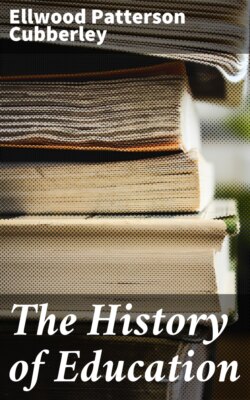Читать книгу The History of Education - Ellwood Patterson Cubberley - Страница 19
На сайте Литреса книга снята с продажи.
QUESTIONS FOR DISCUSSION
Оглавление1. Why are imaginative ability and many-sided natures such valuable characteristics for any people?
2. Why is the ability to make progressive changes, possessed so markedly by the Athenian Greeks, an important personal or racial characteristic?
3. Are the Athenian characteristics, stated in the middle of page 19, characteristics capable of development by training, or are they native, or both?
4. How do you explain the Greek failure to achieve political unity?
5. Would education for citizenship with us to-day possess the same defects as in ancient Greece? Why? Do we give an equivalent training?
6. Which is the better attitude for a nation to assume toward the foreigner—the Greek, or the American? Why?
7. Why does a state military socialism, such as prevailed at Sparta, tend to produce a people of mediocre intellectual capacity?
8. How do you account for the Athenian State leaving literary and musical education to private initiative, but supporting state gymnasia?
9. Would the Athenian method of instruction have been possible had all children in the State been given an education? Why?
10. How did the education of an Athenian girl differ from that of a girl in the early American colonies?
11. Why did the Greek boy need three teachers, whereas the American boy is taught all and more by one primary teacher?
12. Contrast the Greek method of instruction in music, and the purposes of the instruction, with our own.
13. How could we incorporate into our school instruction some of the important aspects of Greek instruction in music?
14. What do you think of the contentions of Aristotle and Plato that the State should control school music as a means of securing sound moral instruction?
15. Does the Greek idea that a harmonious personal development contributes to moral worth appeal to you? Why?
16. Contrast the Greek ideal as to athletic training with the conception of athletics held by an average American schoolboy.
17. Contrast the education of a Greek boy at sixteen with that of an American boy at the same age.
18. Contrast the emphasis placed on expression as a method in teaching in the schools of Athens and of the United States.
19. Do the needs of modern society and industrial life warrant the greater emphasis we place on learning from books, as opposed to the learning by doing of the Greeks?
20. Compare the compulsory-school period of the Greeks with our own. If we were to add some form of compulsory military training, for all youths between eighteen and twenty, and as a preparedness measure, would we approach still more nearly the Greek requirements?
21. Explain how the Athenian Greeks reconciled the idea of social service to the State with the idea of individual liberty, through a form of education which developed personality. Compare this with our American ideal.
22. The Greek schoolboy had no long summer vacation, as do American children. Is there any special reason why we need it more than did they?
23. Do we believe that virtue can be taught in the way the Hellenic peoples did? Do we carry such a belief into practice?
